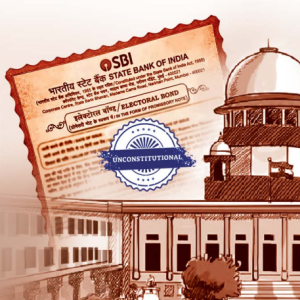
 Fr. Gaurav Nair
Fr. Gaurav Nair

In a real setback to the current government and a rare affirmation of common sense, the Supreme Court, in its verdict on February 15, 2024, struck down the existence of Electoral Bonds as unconstitutional. That it existed so long is discombobulating. The electoral bonds were supposedly instruments to mask contributors from the party so they could not wield their influence in unsavoury ways.
The current regime introduced the Electoral Bonds in 2017-18 amidst cries of foul by the opposition. Arun Jaitley, the finance minister, then termed them "transparent" instruments. He insisted that compelling donors to reveal their identities would resurrect the problematic reliance on cash and illicit funds for political financing.
Good sense and verity have no place within our country, as is evident from the belief of the party that everyone would swallow the narrative hook, line and sinker, which they did even if they did not want to. At least there was no large-scale protest against it. A ruse that seeks to screen deals brokered with those who can buy these bonds, called a transparent mechanism, is a travesty that glares at the face. The parties concerned always knew the details of the transactions. It was only the citizenry who was in the dark. Should we not know what our representatives are planning for us and choose those who would harm us the least?
However, let us not digress. In all its wisdom, the judiciary has at least given us some relief. The bench, comprising Justices D Y Chandrachud, Sanjiv Khanna, B R Gavai, J B Pardiwala and Manoj Misra, struck down a set of amendments to facilitate this unholy plan. Over ninety per cent of the bonds were of one crore, and the BJP was the chief beneficiary, harvesting over 55 per cent of the bonds. The scheme deviously favours unchecked transactions between corporates and parties while it seems to be innocuous.
The court rightly stated that the voters have a right to know information that can be crucial. The funds can sway electoral results and shape policies significantly. Transparency in political funding would empower voters to evaluate any potential link between policymaking and financial donations.
Corporate funding affecting and swaying electoral outcomes has always been a problem. However, reducing transparency, which helps curb increased illegal activity, is not the way forward. Attempts to make political funding more transparent is an ongoing task. As the SC has said, "There are means other than electoral bonds to achieve that purpose". The principles of transparency and accountability must guide the government as they give the issue a deeper look.
While the verdict is heartening, observing that academic discourse was necessary to arrive at it is painful. The Supreme Court has rarely judged against government policies these past few years. This judgement rekindles the faith of the nation in the judiciary. This case demonstrates a lacuna in our government and systems, which enable corporations to mould policymaking in their favour, which, without exception, is detrimental to the lower strata of society.